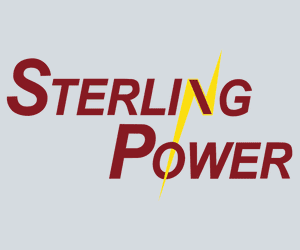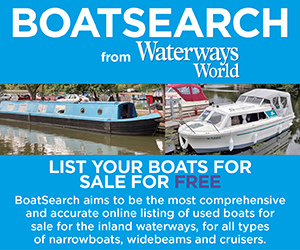Profiles: Company Profiles
Fischer Panda
The Electric Future
Tony Jones speaks to Chris Fower, Fischer Panda UK Sales & Marketing Director, about the future of electric boating on the inland waterways and how boat-builders can get ahead of the curve to become key players in this electrified future.
Electric boating is moving at a frantic pace as the push for sustainability grows, and few companies have been in the field of electric innovation for as long as Fischer Panda UK. Over the last 25 years, it has developed a range of electric propulsion solutions to replace or provide alternatives to diesel engines, including inboard motors, outboard motors, pod motors and hybrid drive systems. “The coastal boating world has been on board with electric propulsion for decades. We supplied our first electric propulsion system in a coastal vessel over 25 years ago, so it’s no surprise that inland boating has followed suit,” says Chris. “Indeed, electric propulsion could be said to be more suited to the inland waterways market as the boating demands are easier to satisfy. Despite the later uptake, the demand for electric boats is taking off quickly. People visiting the recent Crick Boat Show events have come to the Fischer Panda stand wanting to learn about electric boating, whereas just five or six years ago it wasn’t on the agenda.”

Electric boating considerations
Comparing electric motors and power solutions can be difficult for those new to the technology, so Chris helpfully outlines the main factors boaters and boat-builders should consider.
Noise
All electric motors are quieter than diesel, but some electrics are quieter than others. And given that many prospective electric boat -owners are attracted to the peace and quiet of electric boating, the noise output of the motor is a major factor.
“Brushless, water-cooled motors are the gold standard when it comes to near-silent boating” explains Chris. “Air-cooled brush motors are usually noisier although they’re still far quieter than a diesel engine. There’s a place in the market for both air-cooled and water-cooled electric propulsion, with water-cooled being the quieter, premium option.” Unsurprisingly, Fischer Panda UK’s range of electric propulsion motors is exclusively water-cooled and brushless, although the company is planning to launch a range of air-cooled electric motors soon.
Weight and space savings
Electric motors are far lighter than diesel engines, providing greater fuel efficiency. While this isn’t a significant issue for narrowboats, there is a ballasting adjustment to consider – particularly when retro-fitting electric motors to formerly diesel-powered boats. Saving space, however, is an enormous benefit for narrowboaters and particularly liveaboards. “You’ll get far more space to live in and use if you have an electric boat,” says Chris. “You’ll fit an electric motor and a generator into the same space as a typical diesel engine.”
Performance
Apart from their near silence, the most startling difference boaters notice when using an electric boat for the first time is just how responsive and controllable they are. “There’s none of the delay or imprecise power you get with cable-controlled diesel engines,” says Chris. “You nudge the control lever a millimetre and the motor springs into action immediately, with precisely the amount of power you asked of it. The increments are smooth and exactly match the movement of the lever.”
This means that steering and handling an electrically powered narrowboat are on another level compared with a diesel engine, which means locking, winding and mooring are far easier. And, unlike many diesel engines, there’s no detriment to running an electric engine at low revs.
Understanding power output It’s important to understand how the advertised power rating of an electric motor is calculated. Some brands use the nominal output of the motor, but the power output at the propeller can be more than 25% lower. Fischer Panda uses the power output as measured at the propeller to describe all of its products, so it’s important to compare like for like.
Reliability
Electric motors are, without a doubt, more reliable than diesel engines. “In an electric motor there’s only one moving part, compared with the countless things that can go wrong with a diesel. As long as the electric motor has voltage it will turn,” says Chris.
This means electric motors are more reliable, have fewer breakdowns and are easier to fix in comparison. The only wearing parts are the ball bearings, which require annual visual checks with a typical service interval life of 20,000 hours.
“From a design perspective, the current range of Fischer Panda motors are over engineered. They’re S1 rated, which means they are rated for 24/7 commercial use,” says Chris. “Of course, this creates a premium price point, but that’s to be expected from high-grade working materials which experience minimal failure. We’re also bringing to market a series of products for a more leisure-focussed motor for customers with different needs and budgets.”

attracted to the peace and quiet of electric boating.
Who wants an electric boat?
The terminology surrounding electric boating is evolving, and boaters new to the concept will often misunderstand or misinterpret exactly what can be achieved with an electrically propelled boat. “Pure electric boating is almost entirely a fair-weather leisure boater’s pursuit,” explains Chris. “To do away with diesel or petrol entirely requires the boat to have a reliable and regular supply of electricity. They need to be able to charge batteries frequently, and that invariably means plugging in to shoreline power because solar power simply isn’t reliably available all year round in the UK.”
So, the pure-electric boater will usually be marina or boatyard based, making short trips to preferred local moorings, before returning to base to charge up. Or, they might book overnight marina stays at strategic spots to charge up before continuing on their journey. Liveaboards, or those leisure boaters who want to range further afield, will often currently rely on a diesel generator as a backup means to charge the boat’s battery bank. As Fischer Panda UK has been one of the market leaders in quiet, efficient and reliable generator packs, the company is well placed to cater for these markets. These sophisticated inverter-based variable speed generators work only at the RPM required to supply the power demanded of it, rather than constantly running at full speed, making them much more efficient and environmentally friendly.
An electric future No one could have predicted the advancements we’ve seen in the inland-waterways market over the last ten years, but when it comes to the next few years the future is far clearer and it looks electric. Boats are becoming ever-more sophisticated and the influx of new boaters wanting to go electric is increasing year after year. So, why are boat-builders still making diesel boats when the market, the Government and legislation are all pointing toward electric? “I think it’s a legacy of the diesel-based industry that was thriving just a few years ago, coupled with the relatively fast-moving electric motor and battery technologies,” explains Chris. “Things are advancing so quickly that the industry hasn’t had an opportunity to settle into a groove. Choosing and installing an electric motor are still a bit outside the comfort zone of many builders.”
Fischer Panda UK – and companies like them – has the technology, expertise and experience to make the electric revolution happen, and the boat-buying public appears to be ready to go electric too. “We’ve had countless boat buyers ask us to spec an electric system for their boat only to change their minds after talking to their boat-builder who convinces them that a diesel is preferable,” says Chris. “I think whichever boat-builder gets on board first will lead the market. Whoever recruits knowledgeable electrical engineers and can sell, install and maintain electric boats will clean up in this newly emerging market. And we’ll be there to service and support them.”

With this goal in mind, Fischer Panda UK is developing a range of off-the-shelf solutions to suit different requirements. Each package can be modified to create a bespoke instalment fitting a customer’s specific needs. “We also have an installation support package that walks the builder through the pre-install process, installation and post-install commissioning service. We don’t just sell you the engine and send you off on your own. We want to make the electric revolution as simple and enjoyable as possible.”
Leading the way
These boat-builders have already supplied boats fitted with electric motors from Fischer Panda UK:
■ Ortomarine
■ Colecraft
■ Elton Moss
■ JD Narrowboats
Find out more
Fischer Panda
01202 820840
fischerpanda.co.uk



